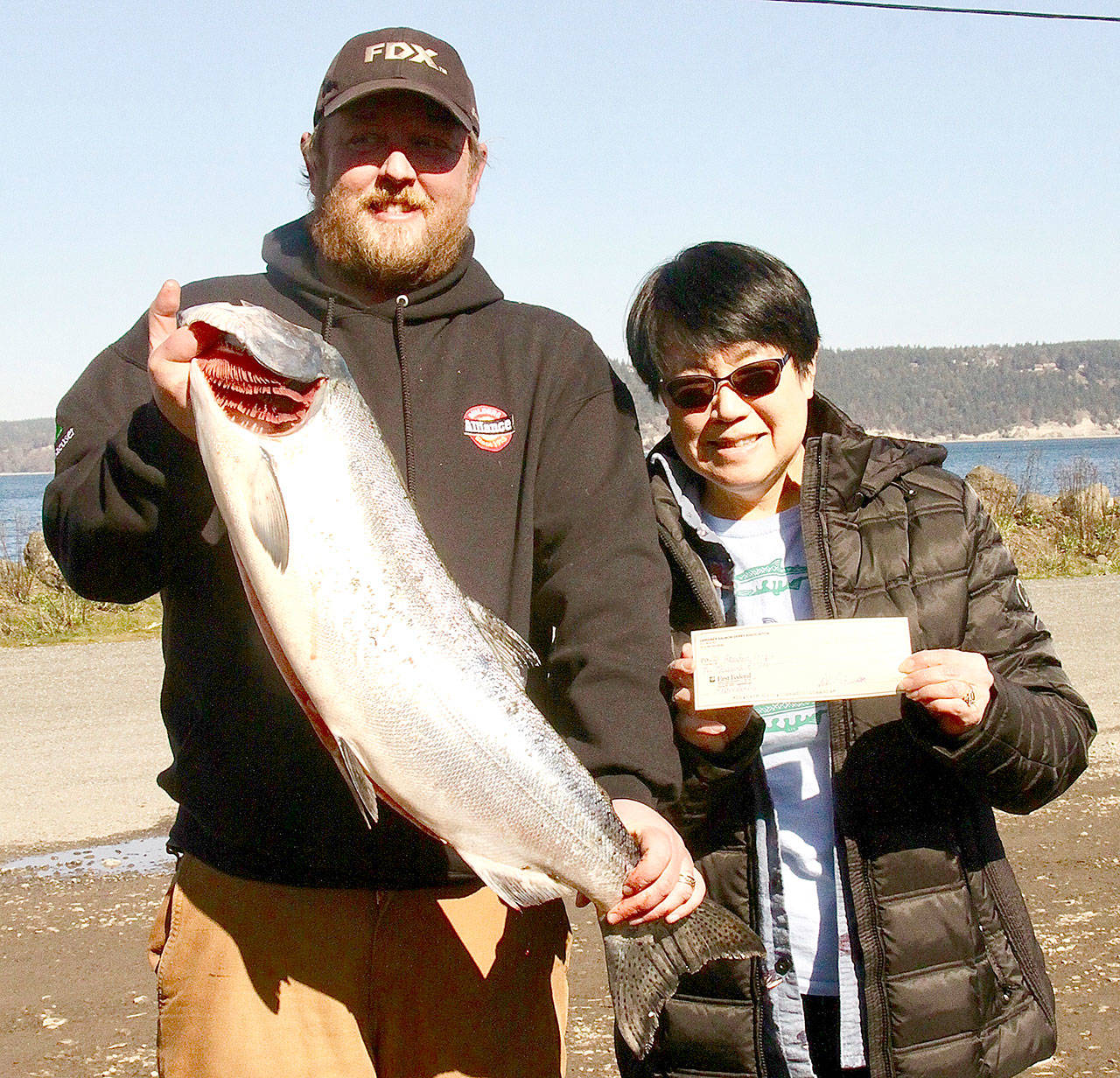OLYMPIA — Because of low returns and damaged habitats, winter chinook fishing in much of the north Puget Sound and eastern Strait of Juan de Fuca would be shut down next year under proposed salmon fishing seasons tentatively approved Friday.
The sate Department of Fish and Wildlife helped developed the proposed seasons along with treaty tribes. They were tentatively set by the Pacific Fishery Management Council. The recommendations will be forwarded to the National Marine Fisheries Service for its approval by May 6.
Proposed closures include a swath of winter chinook fisheries from the mouth of the Lyre River to Port Ludlow and into the Hood Canal. The areas include east Juan De Fuca Strait (Marine Area 6, including Port Angeles, Sequim and Discovery Bay), the San Juan Islands (Marine Area 7), Deception Pass and Port Gardner (areas 8-1 and 8-2), Admiralty Inlet (Marine Area 9, includes Port Townsend), Tacoma-Vashon Island (Marine Area 11) and Hood Canal (Marine Area 12), with some exceptions for chinook non-retention in Hood Canal in November and December. Summer seasons in Deception Pass and Port Gardner are also closed to protect coho.
A bit of good news is Marine Area 5 (Sekiu area, western Strait of Juan de Fuca) was not included in the winter chinook closure and is expected to keep its winter chinook fishery from March 1 to April 30. Full details will be finalized in June.
These closures mean that the Gardiner Salmon Fishing Derby held in March will have to be canceled or changed.
“This is never the outcome we hope for, but until these stocks rebound, this is an unfortunate reality,” said state Fish and Wildlife Director Kelly Susewind. “We continue working alongside the public and tribal, state and federal partners to address all the factors impacting these critical runs.
“These seasons were determined with the goal of meeting conservation objectives while offering opportunities whenever possible, but we had some tough decisions to make this year,” Susewind said.
“This was another difficult year with so many depressed stocks as a result of lost and damaged habitat,” said Lorraine Loomis, Chair of the Northwest Indian Fisheries Commission. “I am especially encouraged by efforts this year to include habitat recovery in fisheries planning. Salmon continue to decline because their habitat is being lost faster than it can be restored and protected. Working together to change that trend is the most important thing we can do for salmon recovery.”
Kathy Watrous with the Gardiner Fishing Derby said the derby’s board of directors is talking about some alternatives to the March chinook derby.
“Our board is aware of it,” she said. “We could just take the year off. We might do a July or August derby. At this point, we’re still just absorbing [the news].”
Watrous said the proposal wipes out other fishing derbies in the Northwest Salmon Fishing Derby series in Washington. The Geoduck Salmon Derby in Brinnon held in January also gets wiped out by the state and PFMC proposal.
Watrous said the derby raises $15,000 every year for scholarships and emergency services in the Gardiner area. She pointed out that doesn’t count the amount of money the derby brings into the area from visitors spending money in the community.
The unpredictability created by the COVID-19 virus, which has largely shut down recreational fishing for the time being, was also discussed by the PFMC.
“This year’s package includes some very restrictive seasons in both commercial and recreational fisheries along much of the coast. Uncertainties associated with the effects of the COVID-19 pandemic on markets, angler effort, and critical catch sampling, coupled with low chinook and coho forecasts, made structuring the fisheries even more challenging this year,” said PFMC Chair Phil Anderson.
Marine Area 4 (Neah Bay area, including the Pacific Ocean and the far western part of the Strait of Juan de Fuca), is part of the ocean fishery and will be decided later.
Some good news is the summer chinook seasons will be similar to last year. Most Puget Sound marine areas will open for chinook retention beginning in July or August. Summer chinook fisheries are expected to begin July 1 in marine areas 5, 6, 7 and 11.
North of Cape Falcon on the northern Oregon coast, the overall non-Indian total allowable catch is 54,000 chinook coastwide (compared with 52,500 last year) and 28,500 marked hatchery coho (compared with 190,000 last year).
Non-Indian ocean commercial fisheries north of Cape Falcon include traditional, but reduced, seasons in the spring (May-June) for Chinook and a summer season (July to mid-September) for Chinook and coho salmon. These fisheries will have access to 27,640 chinook (compared with 26,250 Chinook last year), and a marked coho quota of 2,000 (compared with 30,400 marked coho last year).
The recreational fishery north of Cape Falcon is scheduled to open with an all-salmon-except-coho fishery on June 20, transitioning to an all-species fishery on June 29 and continuing to September 30 or when chinook or coho quotas are reached. Recreational fisheries in this area will have access to 26,360 chinook (compared with 26,250 chinook last year), and a marked coho quota of 26,500 (compared with 159,600 marked coho last year).

